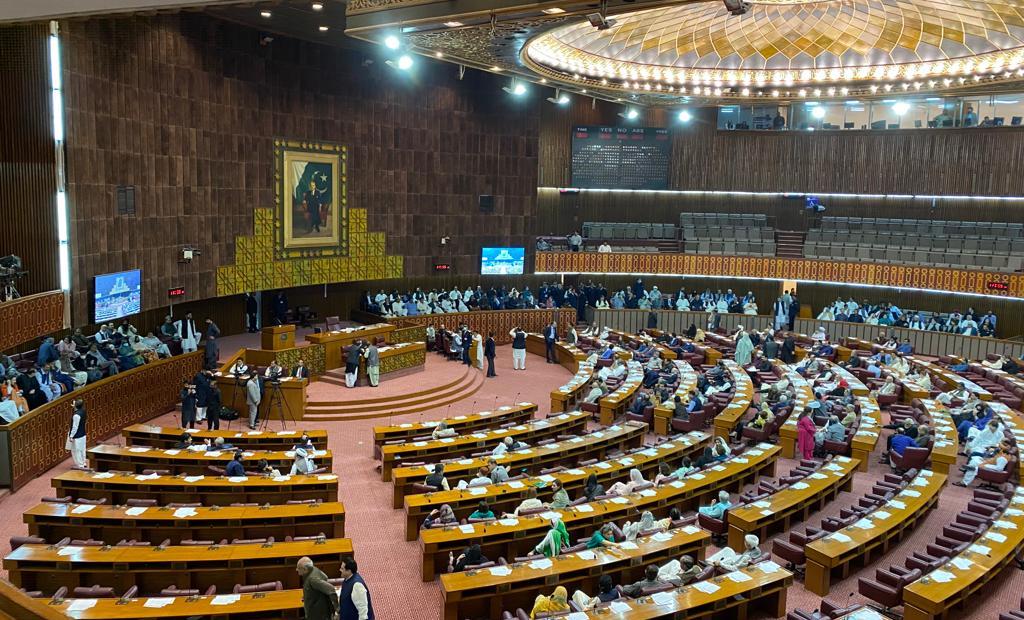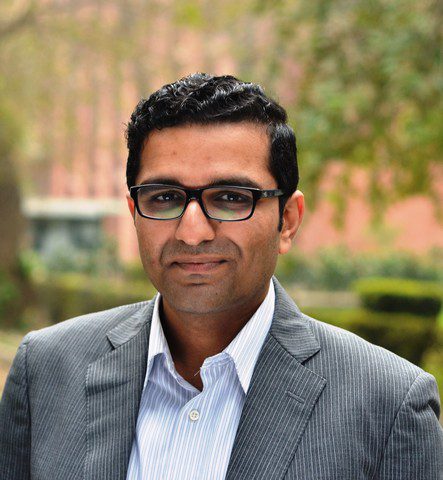
Parliament House, Islamabad. Wikipedia.
Dr. Yaqoob Khan Bangash is a historian of Modern South Asia and a current Fulbright Fellow at the Mittal Institute. His current research interests lie in the emergence of Pakistan as a post-colonial state, with broader interests in decolonisation, modern state formation, formation of identities, and the emergence of ethnic and identity based conflicts. He also regularly writes for The News, Daily Times, The Express Tribune and other newsmedia.
He spoke with the Mittal Institute about the current political crisis in Pakistan, and explored what implications it might have for the larger world.

Dr. Yaqoob Khan Baangash.
Mittal Institute: What is the current state of political affairs in Pakistan? What are some of the key points about the situation that you’d like readers to understand?
Yaqoob Khan Bangash: Pakistan is currently experiencing perhaps its strangest crisis. The usual tug-of-war in Pakistan has been between civilian politicians and the military; however, this time it is between two civilian political forces: the Imran Khan-led Pakistan Tehrik-e-Insaf (PTI) versus most other political parties in the country. Of course, the military remains a crucial and, in a way, deciding factor – but the nature of its involvement has certainly changed from the past. Then there is an assertive Supreme Court, which, against some expectations, gave a strong verdict in favor of constitutionalism. An added interest is that the PTI claims that its government was removed from power because of a U.S. ‘conspiracy’— bringing in issues of global power, U.S. hegemony and regime change.
Mittal Institute: Why is this current political moment in Pakistan one the world should pay attention to?
Yaqoob Khan Bangash: The present crisis in Pakistan is certainly a pivotal moment for the world’s fifth-most-populous country, where over half the country is under 30. It is also nuclear armed, dubbed an ‘Islamic bomb’ by some. Whatever happens in Pakistan not only has implications for the country, but the region and the world.
The present crisis in Pakistan is certainly a pivotal moment for the world’s fifth-most-populous country . . . Whatever happens in Pakistan not only has implications for the country, but the region and the world.
Mittal Institute: Where do these events leave Pakistan’s democracy?
Yaqoob Khan Bangash: This crisis has and will leave an indelible mark on Pakistan’s democracy. The current parliament is the third-straight parliament that, I hope, will finish its term. This has never happened in the country’s history. The vote of no-confidence, which removed Prime Minister Imran Khan, was also a first. What this means at the political level needs to be understood; what this crisis tells us about the state of civil-military relations in Pakistan also needs to be explored. The military is an omnipresent institution in Pakistan, and its action – or perhaps ‘inaction’ in this case – merits investigation. Finally, is the question of the place and role of the constitution in Pakistan. Constitutionalism has historically been weak in the country, which has seen three constitutions in its 75 years of existence – how this crisis is shaping it is a very important discussion.
Mittal Institute: Does the international rise of populism play a role in Pakistan today?
Yaqoob Khan Bangash: Certainly. The rise of populism is the most recent threat to democracy and constitutional values around the world, and it seems that countries in both the developed and developing worlds are struggling to find a response to it. In the US, even though former President Trump lost re-election, a large percentage of Americans still voted for him. The same is true in France where, despite her loss, Marine Le Pen received 42% of the vote. Just next door to Pakistan, Prime Minister Modi in India seems invincible, despite several setbacks in recent years.
In Pakistan, Imran Khan is the present face of populism and is using several of its key tools to his advantage, including harnessing the reach and power of social media. It is important to understand the phenomenon in both its domestic and international dimensions to ascertain its larger impact on several intersecting issues, like the rise in inequality and corruption and challenges to the democratic and nation-state model.
Mittal Institute: What are some of the broader implications of the crisis?
Yaqoob Khan Bangash: Imran Khan’s deployment of a U.S. conspiracy narrative, the use of anti-imperialist rhetoric and calls for an Islamic resurgence all have broader implications. They speak to current debates in the U.S. about its foreign policy; the Islamic world about its role and place in the world; the changing nature of global power relations with the rise of China; and the current Russian-Ukrainian conflict.
I hope that this event will enable participants to learn more about the current happenings in Pakistan, to not only understand its deeper political motivations and impact, but to also relate them to trends around the world, which are reshaping society and politics in many countries.
